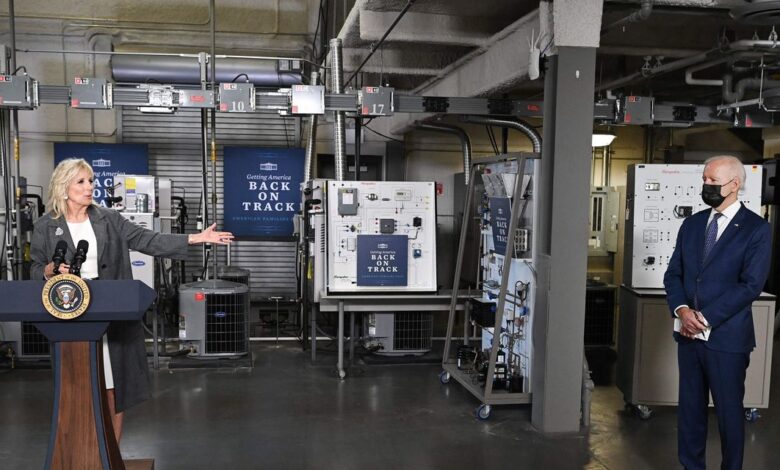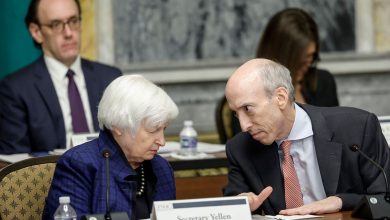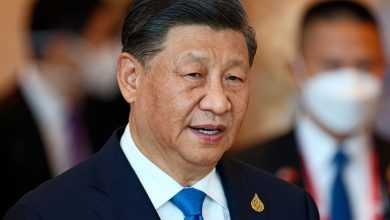After setbacks, Biden tries to revive the idea of free community college

[ad_1]
In the debate surrounding student loan forgiveness, one of the top issues raised by both supporters and detractors is how to prevent student debt from ticking up again. The Biden administration offered at least a partial answer in its budget proposal unveiled last week, but if history is any indication they’ll have trouble making it a reality.
The Department of Education requested $90 billion over 10 years to create a state-federal partnership to make community college free. The return of the proposal offers the latest indication that offering free community college has become a relatively mainstream idea in the Democratic Party. Still, it comes a year and a half after the Biden administration and a Democratic-led Congress failed to bring the idea to fruition.
“Seeing the President’s continued support for free community college is great,” said Max Lubin, the CEO of Rise, an advocacy organization focused on college affordability and other youth and student issues. Still, “we want to see more fight in this administration for that priority to be actually fulfilled this year.”
Fight for free community college goes back several years
The first time free community college made it to the presidential stage, Joe Biden was also in the White House, but then as vice president. In 2015, then-President Barack Obama unveiled his plan to make two years of community college free through a federal state partnership at Pellissippi State Community College in Knoxville, Tenn. Biden and then-Second Lady Jill Biden accompanied Obama on the trip and he pointed to their support for the idea during his speech.
Of the couple, Obama said, “they understand the promise of America’s community colleges. Well Jill really understands it,” he said, referencing Jill Biden’s background as a community college teacher, “and Joe — he doesn’t really have a choice.”
Obama chose Tennessee for the site of his announcement because the Republican-led state was already home to a free community college program — the first of its kind in the nation. Congress didn’t take Obama up on the plan to fund free community college at the federal level, but states and regions started launching programs of their own, which fueled the appetite for a national free community college plan.
“One of the interesting dynamics of the free college conversation over the last decade was the interplay between successful state initiatives and it becoming mainstreamed as a national issue,” said Mark Huelsman, director of policy and advocacy at the Hope Center for College, Community and Justice at Temple University. “These things play off each other.”
By 2016, free community college had made it into the platform of most Democratic candidates for president. Many of the candidates, including the eventual Democratic nominee, Hillary Clinton, also advocated for a path for students to attend four-year college debt free.
Once Democrats took control of the White House and Congress, it looked as if a national free community college plan might actually become a reality. House Democrats included a free community college proposal in their suite of initiatives as part of the Build Back Better plan, the party’s major social spending package. But as negotiations over the legislation faltered, free community college was one of the first major initiatives to be dropped from the package.
It’s hard to say why exactly free community college fell out of the initiative so quickly because the fight over Build Back Better was “opaque,” Lubin said. The Wall Street Journal reported at the time that the plan didn’t have the support of organizations that lobby for other types of universities due to concerns that free community college would draw students away from four-year private and public schools.
What Lubin does know, he said, is that advocates and students felt that in the battle over the various proposals in the Build Back Better plan, free community college “was not prioritized.”
“We’re coming up on 10 years of proposing federal free college and still don’t have it,” he said, adding that, “the Biden folks didn’t fight as hard as we needed them to to get this done,” during the Build Back Better negotiations.
‘Two bites at the apple’
The Biden administration didn’t request funding for free community college during last year’s budget cycle. This time around, they’re taking “two bites at the apple,” Huelsman said.
The Department of Education is requesting $90 billion over 10 years to implement a state and federal partnership that would provide free community college to students looking to earn a degree or credential. The proposed program would be first-dollar, that means that the funds from it would be the first resource applied towards students’ tuition, allowing them to use Pell grants, the money the government provides to low-income students to attend college, for other things like books and living expenses.
The agency is also requesting $500 million for a program to provide grants to individual community colleges or community college systems to offer tuition free programs. To qualify for the funds, the schools need to offer programs that provide a guaranteed credit transfer to a state four-year school or classes that are preparing students for well-paying jobs in in-demand industries.
“Reinforcing that something like free community college or college affordability generally is going to be prioritized in the next two years — or that they’re going to defend that idea even in an era when the budget dynamics are a bit more fraught,” through including it in the budget, Huelsman said, “is a signal that it’s going to be something that this administration feels is unfinished business.”
It’s unlikely the Biden administration will be able to push the proposal through a Republican-led Congress that’s focused on reducing the deficit by cutting spending. But if the political climate changes and Congress appears to be more amenable to free community college, Lubin said he hopes policymakers learned from the Build Back Better fight that “when we do have the opportunity for transformative change in higher education we have to take it, otherwise we find ourselves in a situation like this two years later.”
White House budget proposals are largely political documents, which means even if Congress doesn’t take the administration up on the free community college proposal, it’s possible we’ll hear about it from Biden on the campaign trail if seeks reelection in 2024. In 2020, then-candidate Biden went even further than his administration proposed once he was elected, by saying he would make public universities tuition free for students from households earning less than $125,000.
Any proposals related to that issue could help motivate some of his supporters to turn out. In a poll backed by Rise following the election of Sen. Raphael Warnock, a Georgia Democrat, in a runoff, 84% of Georgia Democratic and Independents said they were more likely to vote for a candidate who proposed expanding free college options.
“What that reflects is an understanding that whether we’re talking about a career certificate, or an associate’s degree, or a bachelor’s degree,” said Lubin, there’s “a pretty broad understanding that if you want to make more than the minimum wage and be economically viable you need some kind of postsecondary higher education, but that the current debt financing model is a real trap for people.”
[ad_2]
Source link



